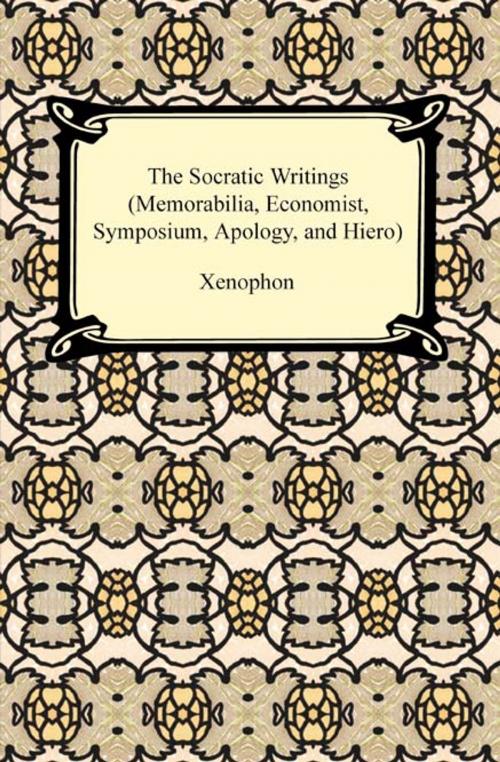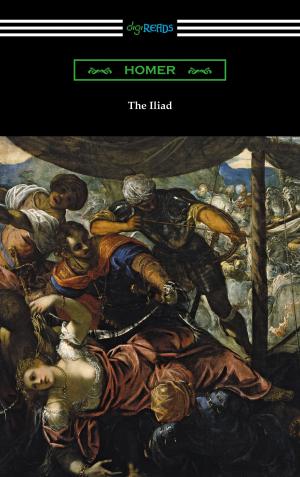The Socratic Writings (Memorabilia, Economist, Symposium, Apology, Hiero)
Nonfiction, Religion & Spirituality, Philosophy, Ancient| Author: | Xenophon | ISBN: | 9781420936872 |
| Publisher: | Neeland Media LLC | Publication: | December 15, 2009 |
| Imprint: | Digireads.com Publishing | Language: | English |
| Author: | Xenophon |
| ISBN: | 9781420936872 |
| Publisher: | Neeland Media LLC |
| Publication: | December 15, 2009 |
| Imprint: | Digireads.com Publishing |
| Language: | English |
A Greek soldier, wealthy Athenian, Attic poet, and historian in the late 5th century B.C., Xenophon was a prolific writer and friend of Socrates during his lifetime. His "Memorabilia" directly defends the charges against Socrates, which were largely religious, but also political, in nature. This work then relates a series of episodes in which Socrates converses with a variety of individuals, from friends to rivals to important Greeks of his day, proving the value and wisdom of Socrates' teachings, as well as revealing a remarkable glimpse into everyday Athenian life. In Xenophon's "Economist," he speaks of household organization and administration, again allowing readers to see Socrates' political philosophy and ancient Greek life from the author's perspective. Aside from being perhaps the earliest work on economics, Xenophon discusses agriculture, rural compared to urban life, the relationships of men and women, slavery, and education. "Symposium" vibrantly relates a witty dinner party in which Socrates and the author were both in attendance, and where each person present defined their idea of virtue and pride. Through an amusing contest of words, Socrates ultimately comes to praise love, particularly that of the host for the boy who he honors with the evening of entertainment. In Xenophon's "Apology," the state of mind and defense of Socrates is related in detail at his trial and execution. The author had as eye-witness Hermogenes, and the account proves an interesting comparison to that of Plato. Finally, there is "Hiero," an extended dialogue between the absolute dictator of Syracuse and the poet Simonides, in which they discuss how the private man has easier access to happiness than a tyrant. Through these five works, Xenophon proves his understanding and admiration for the wisdom of Socrates and both relates that knowledge and applies it to a variety of situations, revealing amazing glimpses into ancient Greece and a famous philosopher's place within it.
A Greek soldier, wealthy Athenian, Attic poet, and historian in the late 5th century B.C., Xenophon was a prolific writer and friend of Socrates during his lifetime. His "Memorabilia" directly defends the charges against Socrates, which were largely religious, but also political, in nature. This work then relates a series of episodes in which Socrates converses with a variety of individuals, from friends to rivals to important Greeks of his day, proving the value and wisdom of Socrates' teachings, as well as revealing a remarkable glimpse into everyday Athenian life. In Xenophon's "Economist," he speaks of household organization and administration, again allowing readers to see Socrates' political philosophy and ancient Greek life from the author's perspective. Aside from being perhaps the earliest work on economics, Xenophon discusses agriculture, rural compared to urban life, the relationships of men and women, slavery, and education. "Symposium" vibrantly relates a witty dinner party in which Socrates and the author were both in attendance, and where each person present defined their idea of virtue and pride. Through an amusing contest of words, Socrates ultimately comes to praise love, particularly that of the host for the boy who he honors with the evening of entertainment. In Xenophon's "Apology," the state of mind and defense of Socrates is related in detail at his trial and execution. The author had as eye-witness Hermogenes, and the account proves an interesting comparison to that of Plato. Finally, there is "Hiero," an extended dialogue between the absolute dictator of Syracuse and the poet Simonides, in which they discuss how the private man has easier access to happiness than a tyrant. Through these five works, Xenophon proves his understanding and admiration for the wisdom of Socrates and both relates that knowledge and applies it to a variety of situations, revealing amazing glimpses into ancient Greece and a famous philosopher's place within it.















